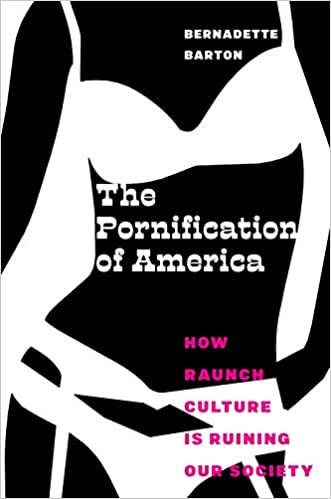The Pornification of America

Full Title: The Pornification of America: How Raunch Culture Is Ruining Our Society
Author / Editor: Bernadette Barton
Publisher: NYU Press, 2021
Review © Metapsychology Vol. 25, No. 31
Reviewer: Hennie Weiss
The Pornification of America: How Raunch Culture is Ruining our Society by Bernadette Barton focuses on the question of what raunch culture is and why it matters? Simply put, raunch culture is sexist, not sexy. Raunch culture is everywhere and has basically become the sex industry moving into mainstream media (starting in the mid 1990s). Raunch culture and the sexualization of women is deeply tied into the notion of hegemonic masculinity (toxic masculinity) emphasizing that men are dominant and women subordinate. As women are reduced to mere body parts, men often express “aggravated entitlement” in regards to women’s bodies, sending “dick pics”, objectifying women and treating them as property. One example of toxic masculinity is President Donald Trump who repeatedly objectify and demean women, had an affair with a porn star and who has repeatedly being accused of sexual harassment and making statements about women such as “Grab ’em by the pussy”.
There are two major players in raunch culture: pornography and various social media platforms. Pornography is everywhere and is an important aspect of raunch culture with the Unites States being the number one porn consumer. With pornography and the pornification of culture being everywhere, it impacts young people’s understanding of sex, often as violent and focusing on pleasuring men. Many women and men report being desensitized to violence and degradation due to pornography.
Social media platforms such as Snapchat, Instagram and Facebook adopt and contribute to raunch culture. Barton coined the term “photo culture” to describe how every situation is documented and how primarily young people focus on looking sexy and hot. Sexy photos are posted in order to get feedback such as likes and comments about a person’s appearance. Depending on the platform, online users can be anonymous and may engage in behaviors they otherwise would not, such as sexting, sexual harassment and sending “dick pics”. Men are more likely to ask for nude or partially nude photos and are more likely to send unsolicited pictures of their genitals. “Consumers of raunch culture routinely confuse hypersexualization with sex positivity (p. 17)”.
Important takeaways include the notion that raunch culture is heteronormative in its presentation of women, is sex-negative, and enables rape culture. The sexualization of women’s bodies is now something not only done to women, but by women. Women participate in self-objectification, masked as a form of female empowerment. As such, women are active participants in raunch culture, yet are often describes as “fat” or “ugly” if they oppose it. In order to fit in or avoid judgment, the “male gaze” is adopted by many women who act like “one of the guys”, participating in the objectification and sexualization of other women. Patriarchy is the underlying structure under which raunch culture thrives, and women are victims of both. Yet, it is important to note that women, as active participants, have the power to work towards creating a positive change for women (and men) and to resist and re-work raunch culture.
Barton ends the book with discussing how to transform raunch culture? In summary, we need to acknowledge the influence of raunch culture, challenge its norms, focus on gender equality, provide sexual education that is pleasure-centered and empower women. Raunch culture is depicted as difficult to challenge because it is everywhere. Pornography is not sex education and discussions should be had, not to demean or belittle, but to talk about the impact of raunch culture on individuals, relationships and society overall. It is important to note that Barton does discuss ways in which to challenge raunch culture, which is refreshing as it is always easier to critique a system than to provide solutions or examples on how to change it. The Pornification of America is reminiscent of similar works such as The End of Sex and Sex and the Soul by Donna Freitas as well as Selling Sex Short by Meagan Tyler and is a valuable contribution to works about sex, the pornification of culture, feminism and the objectification of women. Undoubtedly, the book has a place in every Gender and Women’s Studies class taught in college, but discussions brought up in the book should start earlier than that, with High School students and between parents/caregivers and children.
Hennie Weiss has a Master’s degree in Sociology and a Master’s degree in Social Work from California State University, Sacramento.
Categories: Sexuality
Keywords: porn, popular culture, feminism
